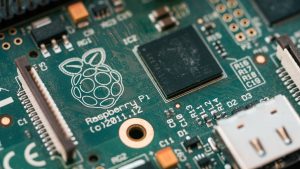Raspberry Pi Ltd has entered the artificial intelligence arena with an innovative new kit developed in collaboration with AI chipmaker Hailo. Unveiled at this week’s Computex trade show, the $70 bundle enhances the Raspberry Pi 5, delivering impressive performance in a compact, energy-efficient package.
The Raspberry Pi AI Kit includes the Raspberry Pi M.2 HAT+ and a Hailo-8L AI acceleration module mounted on an M.2 board. It also comes with a pre-fitted thermal pad for cooling, a 16mm stacking GPIO header, and the necessary hardware to connect the Raspberry Pi M.2 HAT+ to a Raspberry Pi 5 (sold separately).
Hailo CEO and co-founder Orr Danon expressed excitement about the collaboration: “We are thrilled to support Raspberry Pi and empower its vibrant community of professional engineers and creative makers with cutting-edge AI capabilities. Our partnership with the world’s leading single-board computer provider will inspire a new era of computing, enhanced by our high-performance AI processing capacity.”
The HAT (Hardware Attached on Top) module uses the Pi 5’s PCIe 2.0 connection, keeping the GPIO pins available for other devices. Due to the PCIe requirement, the AI kit is only compatible with the Raspberry Pi 5 at launch.
The Hailo-8L can achieve 13 trillion operations per second (TOPS), surpassing the AI hardware in AMD’s first-generation XDNA Ryzen 7040-series devices and Intel’s Meteor Lake processors, which top out at 10 and 11 TOPS, respectively. Although slower than AMD’s upcoming AI 300 chips and Intel’s Lunar Lake chips, which reach 50 and 120 TOPS, respectively, the Hailo-8L offers ample performance for DIY computing at a fraction of the cost.
Eben Upton, CEO of Raspberry Pi, highlighted the benefits: “Our collaboration with Hailo enables Raspberry Pi’s industrial customers to integrate AI into high-performance solutions that are extremely cost-effective and power-efficient. For enthusiasts, the AI Kit provides an accessible way to enhance their creative projects with AI. Hailo’s combination of high compute power and low power consumption make it an incredibly attractive AI solution for professionals and enthusiasts alike.”
Potential applications for the AI-enhanced Raspberry Pi include using AI hardware with cameras for object identification and image recognition. Danon noted that the AI hardware could support various AI models for different applications, including powering AI features in games.
This collaboration between Raspberry Pi and Hailo is set to bring advanced AI capabilities to a broader audience, promoting innovative applications in both professional and hobbyist projects.

